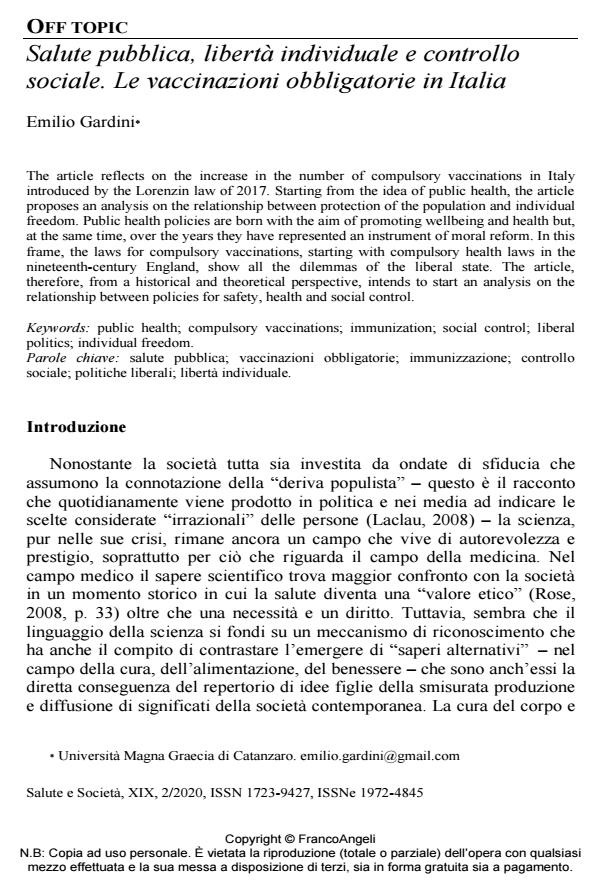Salute pubblica, libertà individuale e controllo sociale. Le vaccinazioni obbligatorie in Italia
Journal title SALUTE E SOCIETÀ
Author/s Emilio Gardini
Publishing Year 2020 Issue 2020/2
Language Italian Pages 15 P. 149-163 File size 353 KB
DOI 10.3280/SES2020-002011
DOI is like a bar code for intellectual property: to have more infomation
click here
Below, you can see the article first page
If you want to buy this article in PDF format, you can do it, following the instructions to buy download credits

FrancoAngeli is member of Publishers International Linking Association, Inc (PILA), a not-for-profit association which run the CrossRef service enabling links to and from online scholarly content.
The article reflects on the increase in the number of compulsory vaccinations in Italyintroduced by the Lorenzin law of 2017. Starting from the idea of public health, the articleproposes an analysis on the relationship between protection of the population and individualfreedom. Public health policies are born with the aim of promoting wellbeing and health but,at the same time, over the years they have represented an instrument of moral reform. In thisframe, the laws for compulsory vaccinations, starting with compulsory health laws in thenineteenth-century England, show all the dilemmas of the liberal state. The article,therefore, from a historical and theoretical perspective, intends to start an analysis on therelationship between policies for safety, health and social control.
Keywords: Public health; compulsory vaccinations; immunization; social control; liberalpolitics; individual freedom.
- Andreani M. (2017). Cittadinanza biologica e individualismo solidale. Tra “No Vax” e caregiving con persone inguaribili. La società degli individui, 60: 88-102. DOI: 10.3280/LAS2017-06000
- Beck U. (2000). La società del rischio. Verso una seconda modernità. Roma: Carocci.
- Biss E. (2014). Vaccini, virus e altre immunità. Una riflessione sul contagio. Milano: Ponte alle Grazie.
- Blume S. (2006). Anti-vaccination movements and their interpretations. Social science & Medicine, 62 (3): 628-42.
- Blume S. (2017). Immunization. How Vaccines became Controversial. Chicago: University of Chicago Press.
- Brunton D. (2008). The politics of vaccination. Practice and policy in England, Wales, Ireland and Scotland, 1800-1874. New York: University of Rochester Press.
- Burioni R. (2017). La congiura dei somari. Perché la scienza non può essere democratica. Milano: Rizzoli.
- Canghuilhem G. (1998). Il normale e il patologico. Torino: Einaudi.
- Castel R. (2011). L’insicurezza sociale. Che significa essere protetti? Torino: Einaudi (ed. or. 2003).
- Durbach N. (2005). Bodily matters. The anti-vaccination moviment in England, 1853-1907. Durham: Duke University Press.
- Foucault M. (1998). Nascita della clinica. Una archeologia dello sguardo medico. Torino: Einaudi. (ed. or. 1963).
- Foucault M. (2005). Nascita della biopolitica. Corso al college de France 1978-1979. Milano: Feltrinelli.
- Foucault M. (2010). Sicurezza, territorio, popolazione. Corso al Collège de France (1977-1978). Milano: Feltrinelli (ed. or. 2004).
- Foucault M. (2017). La volontà di sapere. La storia della sessualità vol. 1. Milano: Feltrinelli. (ed. or. 1976)
- Frank J.P. (1835). Sistema compiuto di polizia medica. Tomo 1. Livorno: Bertani e Antonelli.
- Gobo G. (2019). The intricate relation between science, economy and politics: the MMR vaccine case. In: Schnettler B., Tuma R., vom Lehn D., Traue B., Eberle T.S., a cura di, Kleines Al(e)phabet des Kommunikativen Konstruktivismus: Fundus Omnium Communicativum - Hubert Knoblauch zum 60. Geburstag. Wiesbaden: Springer.
- Gobo G., Sena B. (2018). Oltre la polarizzazione “pro-vax” versus “no-vax”. Atteggiamenti e motivazioni nel dibattito italiano sulle vaccinazioni, Salute e Società, 2: 176-190. DOI: 10.3280/SES2019-00201
- Horkheimer M. (1969). Eclisse della ragione. Torino: Einaudi. (ed. or. 1947).
- La Berge A. (1992). Mission and Method. The Early-Nineteenth-Century French Public Health Movement. Cambridge: Cambridge University Press.
- Laclau E. (2008). La ragione populista. Roma-Bari: Laterza. (ed. or. 2005).
- Le Goff J., Sournia J.C. (1986). Per una storia delle malattie. Bari: Dedalo (ed. or. 1985).
- Lyotard J.F. (2006). La condizione postmoderna. Milano: Feltrinelli (ed. or. 1979).
- Martini L. (1834). Polizia medica. Capolago: Tipografia e libreria Elvetica.
- McKeown T. (1978). La medicina: sogno, miraggio o nemesi? Palermo: Sellerio (ed. or. 1976.).
- McKeown T. (1979). L’aumento della popolazione nell’era moderna. Milano: Feltrinelli (ed. or. 1976).
- Porter D., Porter R. (1988). The politics of prevention: anti-vaccinationism and public health in nineteenth-century england. Medical History, 32: 231-252. DOI: 10.1017/S002572730004822
- Rose N. (2008). La politica della vita. Torino: Einaudi.
- Szereter S. (2005). Health and wealth. Studies in history and policy. New York: University of Rochester Press.
- Sermonti G. (1971). Il crepuscolo dello scientismo. Milano: Rusconi.
- Sermonti G. (1974). La mela di Adamo e la mela di Newton. Milano: Rusconi.
- Villa M.L. (2018). Scienza è democrazia. Come funziona il mondo della ricerca. Milano: Guerini.
- Wolfe R.M., Sharp L.K. (2002). Anti-vaccinationists past and present. British Medical Journal, 325: 430-432. 10.1136/bmj.325.7361.430
- Yaqub O., Castle-Clarke S., Sevdalis N., Chataway J. (2014). Attitudes to vaccination: A critical review. Social Science & medicine, 112: 1-11.
- The warranty-based healthcare system: An innovative approach in public health for the "new normal scenario" Andrea Fontanella, Alessandro Paolo Rigamonti, Alessandro Capocchi, in MECOSAN 130/2025 pp.89
DOI: 10.3280/mesa2024-130oa18961
Emilio Gardini, Salute pubblica, libertà individuale e controllo sociale. Le vaccinazioni obbligatorie in Italia in "SALUTE E SOCIETÀ" 2/2020, pp 149-163, DOI: 10.3280/SES2020-002011